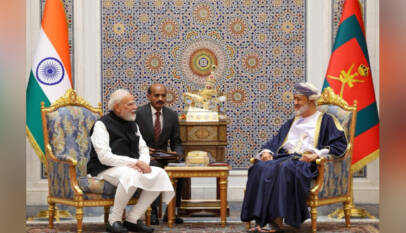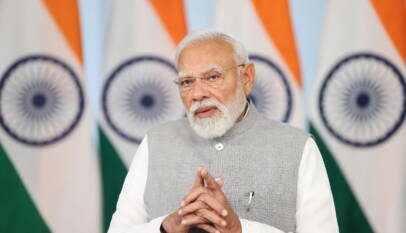Farmers to Benefit from the Agricultural Science Complex at Kashti – Chief Minister Eknath Shinde
Nashik : Chief Minister Eknath Shinde expressed confidence that the Chhatrapati Shivaji Maharaj Agricultural Science Complex at Kashti (Taluka Malegaon) will significantly benefit farmers. Speaking via telephone during the inauguration of the first phase of the Agricultural Science Complex, Shinde noted that the complex will play a vital role in serving the agricultural community. Guardian Minister Dadaji Bhuse presided over the inauguration ceremony.
Several dignitaries were present, including MP Dr. Shobha Bachhao, MLAs Kishore Darade and Manjultai Gavit, Vice-Chancellor of Mahatma Phule Agricultural University Dr. P.G. Patil, Additional Collector Devdutt Kekan, Additional CEO of Zilla Parishad Arjun Gunde, Municipal Commissioner Ravindra Jadhav, and other key officials. The event also saw the attendance of Sub Divisional Officer Nitin Sadgir, Agriculture College Principal Dr. Sachin Nandgude, Tehsildar Vishal Sonwane, and Taluka Agriculture Officer Bhagwan Gorde.
In his remarks, Chief Minister Shinde emphasized the state’s commitment to implementing welfare schemes, highlighting initiatives like the Mukhyamantri’s Beloved Sister Scheme and the decision to provide free education for girls. He expressed his intention to visit the Chhatrapati Shivaji Maharaj Agricultural Science Complex in the near future to engage with citizens.
The complex will offer students advanced educational facilities, with expert professors ensuring quality instruction. Guardian Minister Dadaji Bhuse, in his speech, announced that the complex will be named “Krishi Pandhari” and serve as a hub for students and farmers in North Maharashtra.
The Chhatrapati Shivaji Maharaj Agricultural Science Complex, established in 2020-21 under the Mahatma Phule Agricultural University in Rahuri, is unique in that it houses five agricultural and allied colleges, as well as an agricultural technical college, all in one location. Currently, 300 students enroll annually, and the complex will eventually accommodate 1,200-1,300 students pursuing agriculture-related degrees. A total of 500 to 600 staff members will be employed at the complex. Minister Bhuse also stated that phase two of the complex is already underway and will be completed soon.
The primary goal of the Agricultural Science Complex is to develop an ideal environment for agricultural education in Maharashtra, conduct scientific research on farmers’ challenges, and disseminate solutions through agricultural extension services. In the future, postgraduate and Ph.D. programs in agriculture and related fields will also be introduced.
The minister also spoke about the Nar-Par project, which aims to address water scarcity with a proposed budget of ₹7,500 crore. The project is expected to be completed in the next five to seven years, providing a permanent solution to the region’s water issues. Additionally, Bhuse mentioned that a Women and Child Welfare Hospital in Malegaon has already treated 312 patients in just 17 days, offering healthcare facilities on par with Mumbai hospitals. Other accomplishments include 71,500 beneficiaries under the Sanjay Gandhi Niradhar Yojana and the distribution of safety kits to 20,000 workers.
Facilities at Chhatrapati Shivaji Maharaj Agricultural Science Complex:
- A fully equipped hostel with modern amenities for male and female students
- Canteen on a cooperative basis
- Highly qualified and experienced faculty
- Smart classrooms and modern labs for hands-on learning
- Comprehensive library with access to various subjects
- Wi-Fi campus with 24-hour study rooms
- Active student council promoting academic and social activities
- Professors appointed as counselors to assist students with academic and personal issues
- Sports competitions with opportunities for national representation under the Indian Council of Agricultural Research
- Educational trips and study tours as part of the curriculum
Organizing Visits and Programs for Students:
- Organizing visits for students to various agricultural and ancillary industries/companies, as well as agricultural exhibitions.
- Conducting lectures to prepare students for competitive examinations.
- Establishing a special cell (Training and Placement Cell) to provide entrepreneurship and job opportunities.
- Organizing an Annual Cultural Symposium and a Prize Distribution Ceremony.
- Arranging guest lectures on various subjects for the holistic development of students.
- Providing field facilities for hands-on demonstrations for students.
- Implementing an ELP (Experiential Learning Program) for final-year students.
- Offering a Rural Agriculture Work Experience Program for final-year students to gain hands-on farming experience.
Future Career Opportunities for Students After Graduation:
- After completing their degree, students can pursue master’s degrees at reputed universities in the country.
- Opportunities for higher education in the country’s IIMs, IITs, and agricultural universities at both the Central and state levels.
- Graduates with a degree, postgraduate degree, or Acharya Education in Agriculture can find various positions in Agricultural Universities, the Agriculture Department, banking, marketing, and local self-government. There are also opportunities with national and international NGOs and private companies
Drone Strike Shuts US Embassy in Saudi Arabia as Iran–Israel Conflict Intensifies
New York, March 2026 : The escalating conflict in the Middle East took a sharper turn on T…




















